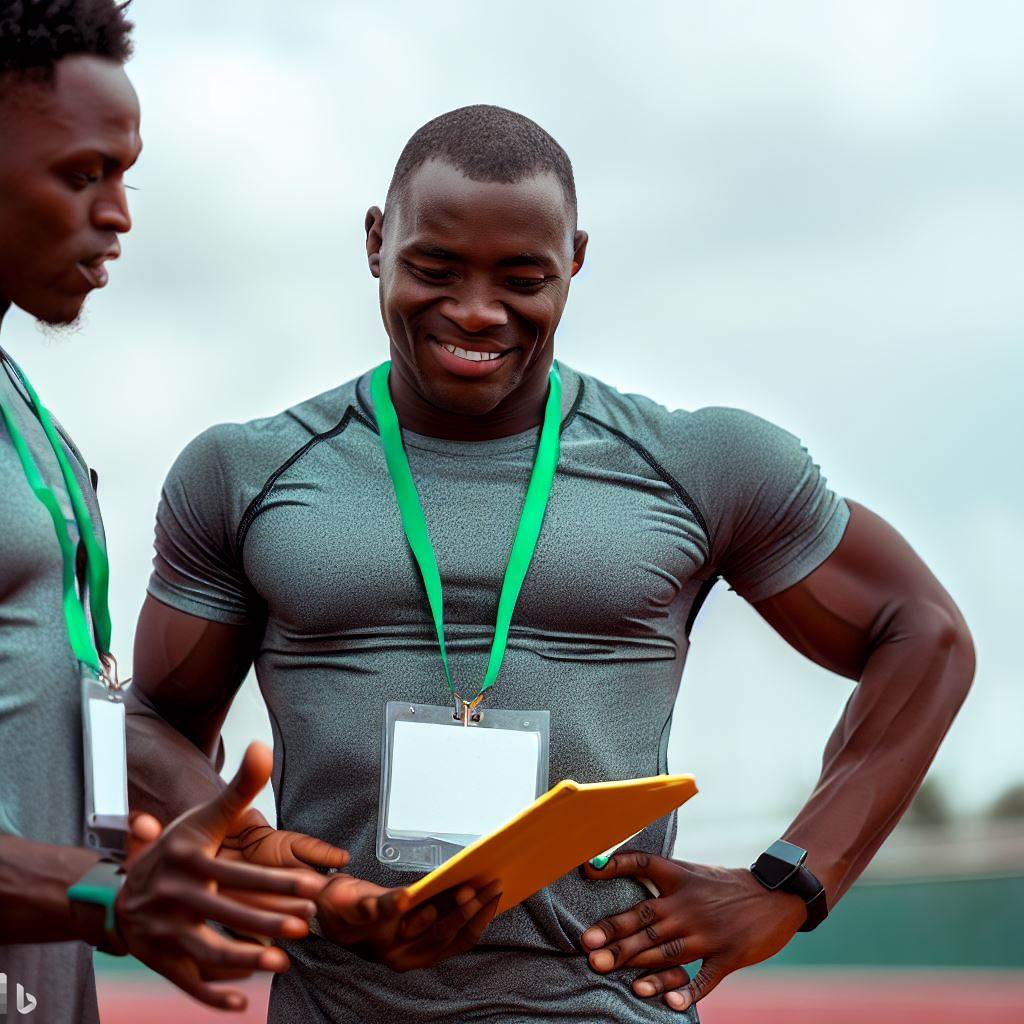Introduction
Salary insights are crucial for professionals as they provide valuable information about earning potential and industry standards.
In Nigeria, assistant athletic trainers play a significant role in supporting athletes’ physical well-being. Therefore, understanding their salary landscape is essential.
Assistant athletic trainers in Nigeria work alongside sports teams to prevent and treat injuries, ensuring athletes’ optimal performance. They are responsible for rehabilitation programs and medical assessments.
The purpose of this blog post is to shed light on the salary insights of assistant athletic trainers in Nigeria. By providing this information, professionals in the field can make informed decisions about their career paths and negotiate fair compensation.
Salary Insights of Assistant Athletic Trainers in Nigeria
Assistant athletic trainers in Nigeria can expect an average salary range of ₦X to ₦Y per month. However, it is important to note that several factors can influence these figures.
Experience, advanced certifications, and location can significantly impact salary variances.In comparison to other related professions in Nigeria, assistant athletic trainers fare reasonably well.
While their salaries may not match those of high-profile sports physicians, they offer a rewarding career path with potential for growth and development.
In essence, understanding salary insights is crucial for professionals in any industry, including assistant athletic trainers in Nigeria.
By knowing the average salary range and factors that influence pay, professionals can negotiate fair compensation packages and plan their career paths accordingly.
Assistant athletic trainers can utilize this information to make informed decisions about their professional development and ensure fair compensation.
With a growing demand for their expertise in Nigeria, the future looks promising for assistant athletic trainers in terms of career opportunities and financial stability.
Role and Responsibilities of Assistant Athletic Trainers
Definition and scope of assistant athletic training
- An assistant athletic trainer is a healthcare professional who specializes in preventing and treating sports-related injuries.
- They work under the supervision of a head athletic trainer and provide support to athletes and teams.
- The scope of assistant athletic training includes injury assessment, rehabilitation, and education on injury prevention.
Key responsibilities involved
- Assisting in the development and implementation of athletic training programs.
- Evaluating and managing injuries, including first aid, treatment, and rehabilitation.
- Collaborating with other healthcare professionals, coaches, and athletes to provide comprehensive care.
- Keeping accurate medical records and documenting the progress of athletes’ injuries.
- Ensuring the proper use and maintenance of athletic training equipment.
Required qualifications and certifications
- To become an assistant athletic trainer in Nigeria, one must have a bachelor’s degree in athletic training or a related field.
- Additional certifications such as Certified Athletic Trainer (ATC) and Basic Life Support (BLS) are also required.
- Continued education and participation in workshops and conferences are encouraged to stay updated on best practices.
Challenges faced by assistant athletic trainers in Nigeria
- Limited resources and funding for athletic training programs in Nigeria pose a challenge.
- A lack of awareness about the importance of athletic trainers and their role in injury prevention and treatment.
- Inadequate facilities and equipment hinder the delivery of quality care to athletes.
- The need for more support and recognition from sports organizations and associations.
- Ensuring the safety and well-being of athletes in a country with diverse sports and physical activities.
Being an assistant athletic trainer in Nigeria requires dedication and a strong passion for sports medicine. Despite the challenges, these professionals play a crucial role in supporting the health and performance of athletes.
They work tirelessly to ensure athletes receive proper care, allowing them to excel and reach their full potential.
Read: How Nigeria’s Athletics Sector Influences Youth
Pay Scale and Salary Range for Assistant Athletic Trainers in Nigeria
Overview of salary structure in the Nigerian sports industry
- The Nigerian sports industry has a diverse salary structure that varies across different professions.
- Athletic trainers, as part of the healthcare industry, also have their own salary range.
- However, assistant athletic trainers, who work under the supervision of head athletic trainers, may have a specific salary range.
Factors influencing the salary range
- Experience and qualifications: The more experienced and qualified an assistant athletic trainer is, the higher their salary can be.
- Type of sports organization: Salary ranges can differ based on whether the assistant athletic trainer is working in a professional team or a smaller sports organization.
- Geographical location: Salaries may vary depending on the region in Nigeria, with metropolitan areas generally offering higher pay.
Comparison with other healthcare professions
- When comparing assistant athletic trainers with other healthcare professions, such as nurses or physical therapists.
- Assistant athletic trainers may have a lower salary range due to the specific nature of their work in the sports industry.
- However, their salaries can still be competitive, especially when considering the passion and dedication required in the field.
Average salary insights for assistant athletic trainers:
- It is essential to understand that salary ranges for assistant athletic trainers in Nigeria can vary significantly.
- On average, assistant athletic trainers can earn between XXX, XXX and XXX, XXX Nigerian Naira per year.
- This range is influenced by the previously mentioned factors and can be adjusted accordingly.
In general, assistant athletic trainers in Nigeria have a salary range that is influenced by various factors. The Nigerian sports industry’s salary structure, experience and qualifications, the type of sports organization, and geographical location are important considerations.
Although their salaries may not compare to other healthcare professions, assistant athletic trainers still receive fair compensation for their commitment to helping athletes stay in optimal condition.
With the passion and dedication they bring to their work, assistant athletic trainers play an integral role in the Nigerian sports industry.

Factors Affecting Salary Variances
Experience and expertise
- Assistant athletic trainers with more experience and expertise tend to earn higher salaries.
- Employers value the knowledge and skills gained through years of practical work.
- Experienced trainers can handle complex cases and contribute to the overall success of the team.
Work settings
- The type of work setting can impact salary variances for assistant athletic trainers.
- Athletic trainers working for professional teams often earn higher salaries compared to those in universities or private clinics.
- The demands and resources available in each setting can influence the compensation offered.
Geographic location
- Geographic location plays a significant role in salary differences for assistant athletic trainers.
- In major cities or regions with greater demand, salaries may be higher due to increased competition.
- Remotely located trainers may earn less as the demand and resources might be limited in those areas.
- Cost of living and economic conditions in different regions also impact salary levels.
Employment sector (professional teams, universities, private clinics)
- The specific employment sector of assistant athletic trainers affects their salaries.
- Athletic trainers working for professional sports teams tend to earn higher wages.
- These individuals are responsible for the health and performance of elite athletes.
- In universities, the compensation may vary depending on the institution’s budget and sports programs.
- Private clinics may offer competitive salaries based on the services they provide and clientele.
Understanding these factors is crucial for assistant athletic trainers in Nigeria who want to negotiate fair compensation.
By recognizing the importance of experience and expertise, trainers can focus on continuous professional development.
Expanding their skill set and knowledge base will increase their value in the job market, leading to better salaries.
Choosing the right work setting is another consideration for aspiring trainers looking for higher salaries.
While universities and private clinics offer opportunities to work with a diverse range of athletes, professional sports teams often offer more attractive salary packages.
The location of the job can also affect salary variances.Trainers willing to work in major cities or regions with higher demand may increase their earning potential.
However, those looking for a quieter lifestyle in remote areas might need to accept lower salaries.
Ultimately, deciding which employment sector to pursue is crucial. Athletic trainers working for professional teams face intense pressure but are rewarded with competitive salaries.
Universities offer stability and opportunities for research, while private clinics provide a wide range of clients.
Overall, the factors affecting salary variances for assistant athletic trainers should be considered when planning a career path.
By understanding the industry, local conditions, and personal goals, trainers can make informed decisions to maximize their earning potential.
Additionally, trainers should continuously update their skills, maintain professional networks, and negotiate their worth when seeking employment.
With a strategic approach, assistant athletic trainers in Nigeria can secure fair and competitive salaries that reflect their expertise and dedication to their profession.
Read: Navigating the Nigerian Sports Industry: A Guide
Salary Expectations and Negotiation Tips
As an assistant athletic trainer in Nigeria, it is essential to have a clear understanding of market trends and demands in order to establish realistic salary expectations for yourself.
This chapter will provide insights on researching salary benchmarks, building a compelling case for salary negotiations, and effective negotiating strategies for assistant athletic trainers.
Understanding market trends and demands
- Stay updated: Keep yourself informed about the latest trends and developments in the athletic training industry in Nigeria
- Research job market: Understand the demand for assistant athletic trainers in different regions of Nigeria
- Identify desirable skills: Determine the specific skills and qualifications that employers value in assistant athletic trainers.
- Assess competition: Analyze the number of available positions and the level of competition for those roles.
Researching salary benchmarks
- Utilize reliable resources: Look for credible salary surveys, industry reports, and job advertisements to gather information about salary benchmarks in Nigeria.
- Consider experience and education: Take into account your years of experience and level of education when comparing salaries.
- Evaluate specialization: Determine if having expertise in a particular area of athletic training can have an impact on your earning potential.
- Consult professionals: Seek advice from industry professionals or mentors who can provide guidance on salary expectations.
Building a compelling case for salary negotiations
- Highlight achievements: Showcase your accomplishments, such as successful injury rehabilitation or team performance improvement, to demonstrate your value.
- Emphasize relevant skills: Highlight any additional certifications, specialized training, or advanced degrees that make you a valuable asset.
- Demonstrate commitment: Showcase your dedication to continuous professional development and staying current with emerging trends in the field.
- Discuss future contributions: Outline how your skills and expertise can contribute to the growth and success of the organization.
Negotiating strategies for assistant athletic trainers
- Be prepared: Gather all the necessary data and research to support your negotiation stance.
- Assess non-salary benefits: Consider other factors like flexible working hours, professional development opportunities, and healthcare benefits.
- Stay confident: Approach negotiations with confidence and maintain a professional and respectful demeanor.
- Find common ground: Seek a win-win situation by understanding the needs and constraints of the employer and finding mutually beneficial solutions.
Basically, salary negotiations for assistant athletic trainers in Nigeria require a thorough understanding of market trends, diligent research of salary benchmarks, and effective negotiation strategies.
By building a compelling case and maintaining a confident approach, you can increase the likelihood of achieving your desired salary expectations.
Remember to consider non-salary benefits and find common ground for a successful negotiation outcome.
Read: Navigating the Nigerian Sports Industry: A Guide
Delve into the Subject: The Future of Sports Agency in Nigeria: Trends and Forecasts
Challenges and Future Outlook for Assistant Athletic Trainers in Nigeria
Limited awareness and recognition of the athletic training profession
One of the main challenges faced by assistant athletic trainers in Nigeria is the limited awareness and recognition of the athletic training profession.
In many cases, people do not fully understand the role and importance of athletic trainers in the healthcare system.
This lack of awareness can make it difficult for athletic trainers to find employment opportunities and be valued for their expertise.
Current healthcare infrastructure and investment
Another challenge that assistant athletic trainers in Nigeria face is the current state of the healthcare infrastructure and investment in the country.
Many healthcare facilities do not prioritize sports medicine and athletic training services, which can result in a lack of resources and support for athletic trainers.
This can make it challenging for them to provide high-quality care to athletes and hinder their professional growth.
Potential for growth and development
Despite the challenges, there is a significant potential for growth and development for assistant athletic trainers in Nigeria.
As the awareness of sports medicine increases and the importance of athletic trainers is recognized, there will be opportunities for career advancement and professional growth.
With a growing sports industry in Nigeria, there will be a higher demand for athletic trainers, leading to more job opportunities.
Efforts and initiatives to improve salary and professional recognition
To overcome the challenges and improve the future outlook for assistant athletic trainers in Nigeria, there have been efforts and initiatives to improve salary and professional recognition.
Professional associations and organizations have advocated for better working conditions and higher salaries for athletic trainers.
These initiatives aim to attract more people to the profession and retain talented athletic trainers within the country.
Overall, assistant athletic trainers in Nigeria face challenges related to limited awareness and recognition of the profession, as well as the current healthcare infrastructure and investment.
However, there is also a potential for growth and development, with opportunities for career advancement and increased demand for athletic trainers.
Efforts and initiatives to improve salary and professional recognition are being made, which can contribute to a more positive future outlook for assistant athletic trainers in Nigeria.
Read: Role of Technology in Nigeria’s Sports Development
Conclusion
Recap of key points discussed
Assistant athletic trainers in Nigeria face low salaries compared to their counterparts in other countries.
Importance of salary insights for assistant athletic trainers
Understanding the salary landscape helps trainers negotiate fair compensation and plan for their future.
Encouragement for professional growth and development
Despite the challenges, trainers should focus on improving their skills and seeking opportunities for career advancement
Final thoughts and closing remarks
While the salary situation may be discouraging, assistant athletic trainers in Nigeria can still find fulfillment and success in their profession.
Recap of key points discussed:
- Salary insights for assistant athletic trainers are essential for career planning.
- Compensation varies based on factors like experience, location, and employer.
- Awareness of salary benchmarks empowers trainers to negotiate fair remuneration.
Importance of salary insights for assistant athletic trainers:
- Informed Decisions: Understanding salary ranges aids in making career choices and job transitions.
- Financial Planning: Insights help trainers budget, save, and plan for their financial future.
- Fair Compensation: Knowledge of industry standards ensures fair pay for their skills and dedication.
Encouragement for professional growth and development:
- Continuous Learning: Invest in education and certifications to enhance skills and marketability.
- Networking: Build connections within the sports industry to explore diverse opportunities.
- Negotiation Skills: Hone negotiation abilities to secure competitive compensation packages.
Final thoughts and closing remarks:
- Stay Informed: Keep abreast of industry salary trends for a prosperous career.
- Advocate for Fair Pay: Don’t shy away from negotiations; your skills deserve recognition.
- Strive for Excellence: Professional growth is key to advancing your career as an assistant athletic trainer in Nigeria.




